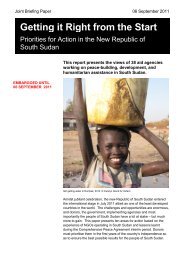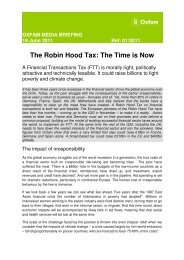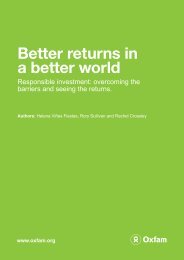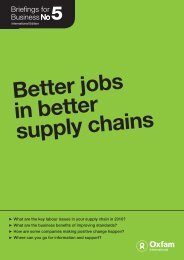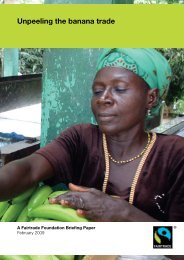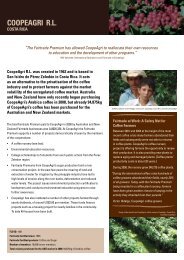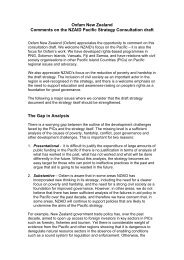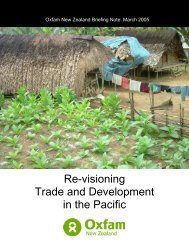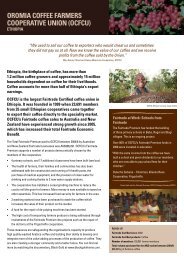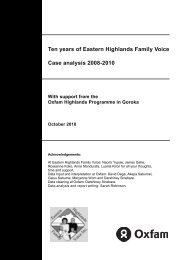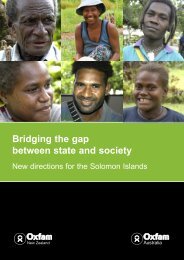Growing a Better Future - Oxfam International
Growing a Better Future - Oxfam International
Growing a Better Future - Oxfam International
- No tags were found...
Create successful ePaper yourself
Turn your PDF publications into a flip-book with our unique Google optimized e-Paper software.
3.5The firststeps:<strong>Oxfam</strong>’sagendaAchieving the three shifts outlined will take time. <strong>Oxfam</strong>,with others, proposes the following agenda in theimmediate years.1. In order to build a new global governance to avert foodcrises, <strong>Oxfam</strong> will campaign with others to:• Reduce volatility and the likelihood of global food pricecrises through an increase in public pressure to fix themain problems, including opaque international markets,an inability to deal with export restrictions, damagingbiofuel policies, and excessive speculation.--The G20 and its members should agree specificmeasures to rein in and re-govern markets, includingmeasures to increase transparency, deal with exportbans, and regulate excessive financial speculation.In the medium term, the Committee on World FoodSecurity should lead coordination mechanisms toaddress these issues more broadly.--The EU and USA must dismantle support for biofuels• Mitigate the impacts of food crises at different levels,working to:--Establish local, national, and regional food reserves;--Encourage national governments and donors tocreate and sustain safety net programmes indeveloping countries targeting food insecure peopleand women in particular;--Encourage national governments and donors toinvest in improved and more effective early warningsystems, disaster risk reduction, and climateadaptation.• Ensure a fast and fair response in the event of crises,including by international institutions (such as the WorldBank) that supply balance of payments support; andthose donors and institutions responsible for theprovision and delivery of food aid.• Stop investors and corporations undertakingirresponsible large-scale land investments whichundermine vulnerable people’s access to resourcesand food security:--Naming and shaming investors or corporationswhose value chains or direct investments areimplicated in land and water grabs;--Making sure that institutions and norms that influenceinvestor behaviour are held to high standards inrelation to land and natural resources;--Helping ensure that agribusiness sectors orcommodity chains, starting with food and beveragecompanies and traders, adopt responsible investmentpolicies and practices in relation to land.2. In order to build a new agricultural future, we willactively campaign to increase public and privateinvestment in small-scale food production. We willseek change that guarantees:• Donors and governments invest in the productivity,resilience, and sustainability of small-scale foodproducers. For that purpose:--Major donors should adopt policies that promotesustainable, resilient and inclusive agriculture andadaptation. Donors will be held to account againsttheir l’Aquila commitments to invest in agricultureand food security, and their Copenhagencommitments to invest in climate adaptation.--National governments (and regional bodies) shouldagree adaptation strategies and agriculturaldevelopment policies and frameworks that promotesustainable, resilient and inclusive agriculture. Theseshould be backed by public investment, and ensurethat small food producers and women producersparticipate in decision making.• Companies invest in the productivity, resilience andsustainability of small food producers. We willcontribute to this by:--Advocating for major companies to invest insustainable, resilient smallholder agriculture. This willinclude the design and development of a food justiceindex that will evaluate the progress of different privateactors against this objective.62



